- Aug 22
- Uncategorized
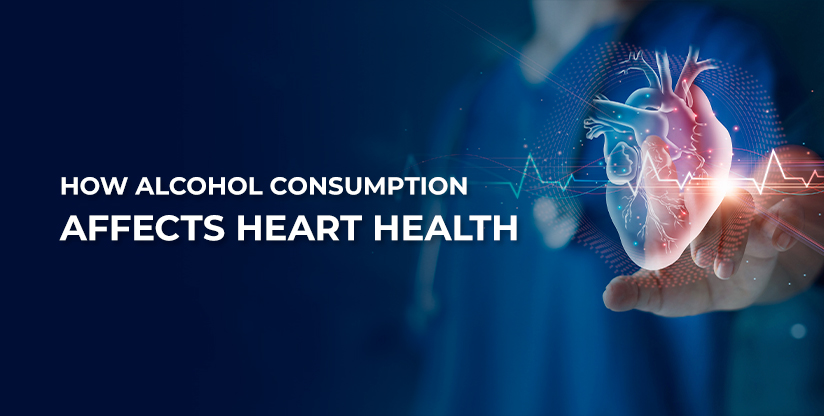
The circulatory system is one of the body’s most essential systems. The heart muscle works with arteries, veins, capillaries and ventricles to pump blood throughout your body, delivering blood, oxygen and nutrients to your organs so they can function properly. Maintaining heart health is essential to living a long, healthy life, so protecting your heart is vital.
Alcohol use can significantly affect heart health and lead to health issues such as high blood pressure and increased heart rate. Over time, alcohol’s effects can increase your risk of serious heart conditions such as stroke, heart attack, weakened heart muscle and congenital heart failure.
Protecting your circulatory system from the damaging effects of alcohol can result in a lower risk of heart disease. Continue reading to learn about alcohol consumption, heart health and how you can protect your heart from the effects of alcohol.
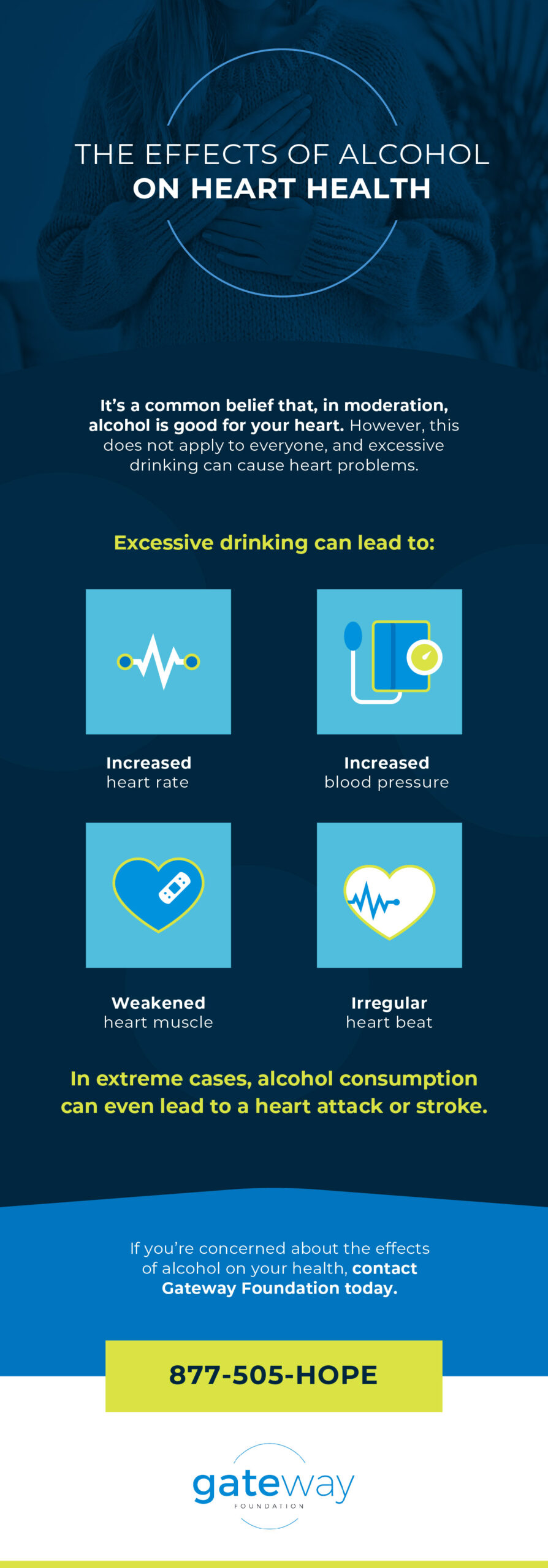
How Does Alcohol Affect the Heart?
Alcohol consumption increases the risk of developing heart disease. Your cardiovascular system consists of blood vessels, arteries, veins, capillaries and the heart. Your heart is the pump that sends blood traveling through this system, delivering nutrients throughout your body.
When you consume alcohol, it enters your bloodstream through the stomach and small intestine. The alcohol then travels to other organs, including the heart, which can have significant short-term and long-term effects on its health.
Any amount of drinking can affect the heart. While moderate drinking may seem safer than heavy alcohol consumption and binge drinking, it can still increase the risk of heart disease and other health problems over time.
Short-Term Effects of Alcohol on the Heart
Alcohol can affect your heart as you drink it and directly afterward. These temporary effects may seem minor at first, but they can increase your risk of developing other health conditions in the future. Alcohol consumption can cause the following short-term effects:
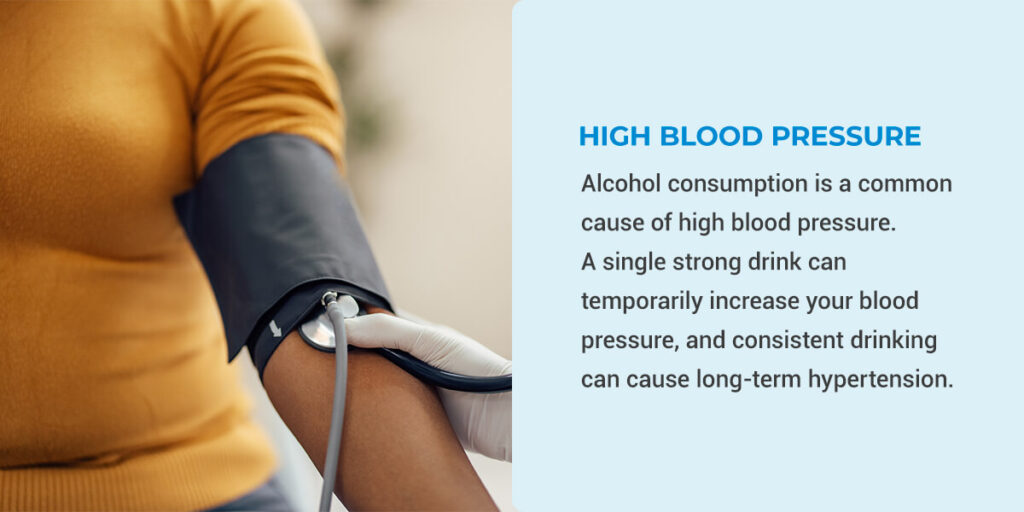
High Blood Pressure
Blood pressure is the force that blood applies to artery walls as it flows throughout the body. You have high blood pressure if your blood is applying more force than usual.
Alcohol consumption is a common cause of high blood pressure. A single strong drink can temporarily increase your blood pressure, and consistent drinking can cause long-term hypertension. High blood pressure can also thicken and harden arteries, which can lead to a stroke or heart attack.
Increased Heart Rate
Heart rate refers to the number of times your heart beats every minute. Drinking just one alcoholic beverage increases your heart rate, and drinking more increases the effect. Alcohol consumption can lead to conditions that cause tachycardia, a faster-than-normal cardiac rhythm.
Although tachycardia is a normal response to stress or physical activity, it is unhealthy when it occurs at rest. Frequent or consistent tachycardia episodes can cause blood clots and long-term complications such as stroke and heart attack.
Long-Term Effects of Alcohol on the Heart
Heavy drinking also has long-term effects on your overall health, including the heart. Chronic alcohol use takes a toll on the body and will damage the heart over time. The short-term effects of alcohol use can gradually increase your risk of developing the following heart conditions:
Weakened Heart Muscle
The heart uses pressure to circulate blood throughout the body and its myocardium — or muscle layer — is what allows it to contract.
Regular alcohol use can damage the heart muscle and lead to alcoholic cardiomyopathy, a condition that causes the muscle to stiffen or thicken. Alcoholic cardiomyopathy is responsible for 10% of dilated cardiomyopathy cases, which makes it harder for the heart to pump as the muscle thins and the chambers expand. Dilated cardiomyopathy weakens the heart’s contractions and hinders circulation.
Congestive Heart Failure
Cardiomyopathy can also lead to congestive heart failure. Heart failure occurs when your heart isn’t able to pump enough blood throughout the body to support your other organs. Alcohol use that leads to cardiomyopathy also increases the risk of congestive heart failure.
Stroke
Alcohol consumption can increase the risk of stroke, which occurs when there’s a disruption in the brain tissue’s blood supply. Without the oxygen that your blood delivers, brain cells start dying within minutes. A stroke can lead to loss of motor and sensory functions, which control movement and your sense of touch and temperature.
Alcohol can increase your risk of both an ischemic and a hemorrhagic stroke:
- Ischemic stroke: An ischemic stroke occurs when a blood clot or foreign body lodges in an artery and blocks blood flow to the brain. As alcohol weakens your heart muscle, dysregulates your heartbeat, increases fat levels in your blood and raises blood pressure, it can cause a blood clot to form and lead to an ischemic stroke.
- Hemorrhagic stroke: A hemorrhagic stroke is the result of a tear in an artery that supplies blood to brain tissue, where the bleeding places too much pressure on your brain cells. When alcohol causes high blood pressure, it may eventually weaken an artery in the brain and lead to a hemorrhagic stroke.
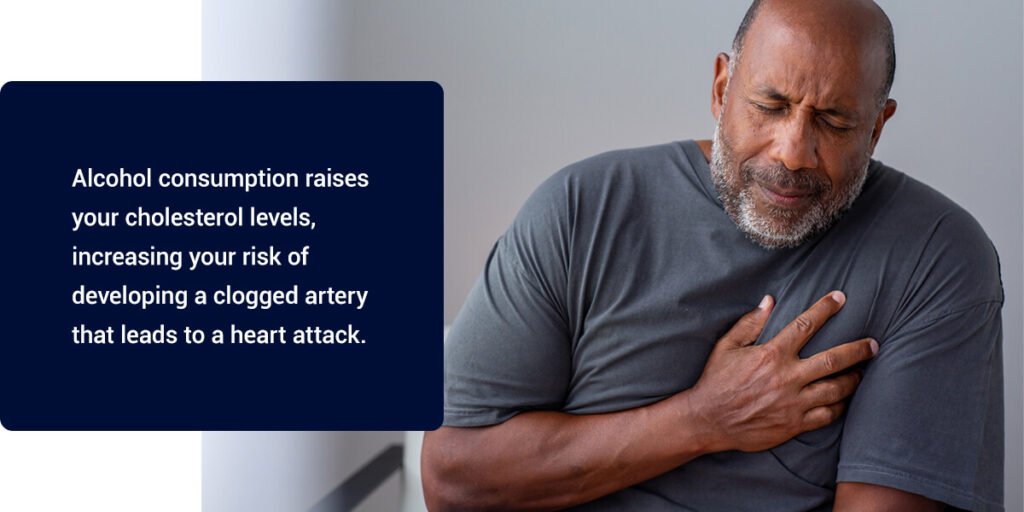
Heart Attack
The heart requires oxygen to continue pumping. When an artery that supplies oxygen to the heart is cut off or restricted, the lack of oxygen can lead to a heart attack.
Fat, plaque and cholesterol can accumulate in your bloodstream, narrowing your arteries and blocking blood flow to your heart. Alcohol consumption raises your cholesterol levels, increasing your risk of developing a clogged artery that leads to a heart attack.
Wait, I Thought Alcohol Was Good for Your Heart?
The widespread belief that alcohol is good for your heart may rely on inaccurate evidence. While past studies claimed that there were health benefits to having a couple of alcoholic drinks a day, their results may have more to do with the participants’ genetics and behaviors than their alcohol consumption. Although previous studies led people to believe that a glass of wine could reduce their risk of heart disease, there is not enough evidence to prove this is true.
The different levels of health risks between people who drink alcohol and those who abstain could have more to do with their lifestyles and their reasons for drinking or avoiding alcohol. For example, some people with a higher risk of health complications may avoid alcohol because of a preexisting condition that increases their risks, requiring them to abstain from alcohol use. Additionally, some people might have irregular drinking habits or misreport how much or how little alcohol they drink.
Other factors can affect participants’ overall health, including:
- Socioeconomic status
- Income
- Diet
- Activity level
- Education level
- Where they live
A study participant in good health who reports drinking a glass of red wine each day is not sufficient proof that drinking wine is a significant health benefit. They may be in good health because of a healthy diet, regular exercise routine and a lifestyle that lets them avoid stress.
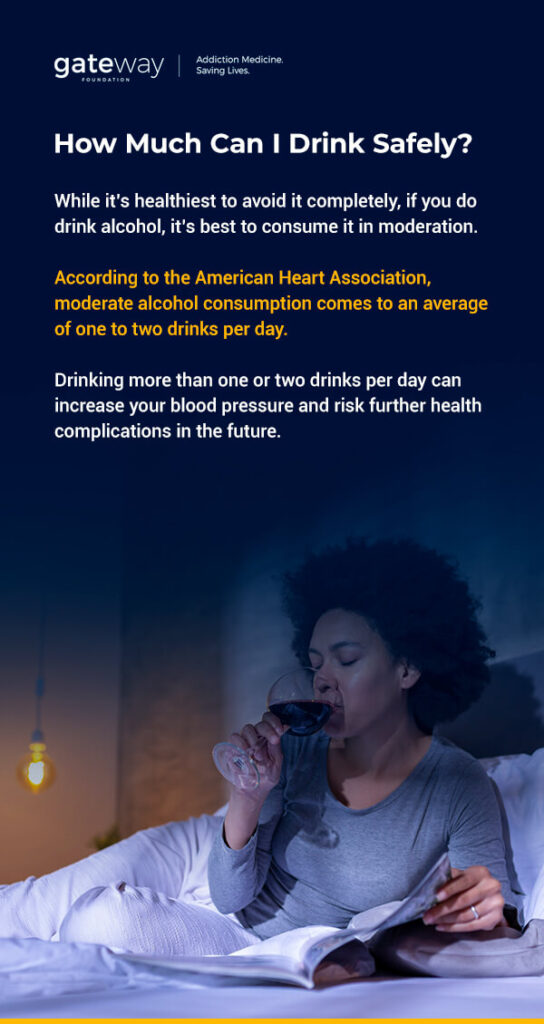
How Much Can I Drink Safely?
While it’s healthiest to avoid it completely, if you do drink alcohol, it’s best to consume it in moderation. According to the American Heart Association, moderate alcohol consumption comes to an average of one to two drinks per day. Binge drinking or frequent and heavy alcohol use can affect several areas of the body and lead to various health complications.
Drinking more than one or two drinks per day can increase your blood pressure and risk further health complications in the future. Limiting your alcohol intake or avoiding it entirely can help you prevent heart conditions and lower your blood pressure.
How to Protect Your Heart
The heart serves a vital function, providing nourishment and oxygen to your entire body. Protecting your heart is one of the best things you can do for your health.
How you care for your heart health now can determine your health in the future as you age, so it’s critical to be mindful of your lifestyle habits. You can protect your heart from alcohol in the following ways:
Limit or Avoid Drinking
Avoiding alcohol is one of the most effective ways to reduce your risk of heart disease. Abstaining from alcoholic drinks can help you maintain healthy blood pressure and prevent serious heart conditions. If you do drink alcohol, it’s best to consume it only occasionally and to drink in moderation when you do.
Limit your alcohol intake to one or two drinks a day at most. You can use the following strategies to help you avoid alcohol or decrease your intake:
- Bring non-alcoholic drink alternatives to events and outings.
- Avoid events and activities that revolve around alcohol consumption, such as bars or drinking games.
- Create a plan to reduce your drinking and start with small goals.
- Explain your goals to your loved ones so they can support your efforts to avoid alcohol.
- Engage in fun activities and hobbies that you enjoy.
Recognize the Signs of Alcohol Addiction
Alcohol use disorder can hinder your ability to avoid alcohol and alcohol dependence can significantly affect your health. It may lead you to drink excessive amounts of alcohol, consume alcohol often and drink even when your health is in danger.
Recognizing the signs of alcohol addiction can help you identify when you may need to take extra care of your health. You may have an alcohol use disorder if you notice the following signs and symptoms:
- You spend most of your day purchasing or drinking alcohol.
- You drink more alcohol than you intend to.
- You consume alcohol more often than you intend to.
- You continue to drink even when it affects relationships with your loved ones.
- You have difficulty completing tasks at home, work or school.
- You drink when it is dangerous to do so, such as when you are driving.
- You experience frequent and intense alcohol cravings.
- You continue to drink even when you experience negative psychological and physical symptoms.
- You allow your drinking habits to interfere with your activities or hobbies.
- You’ve built a tolerance for alcohol and need to drink more of it to feel its effects.
- You experience withdrawal symptoms such as sweating, nausea, racing heart, restlessness, hallucinations or shakiness when you try to stop drinking or reduce your alcohol intake.
If you identify with any of the symptoms above, you aren’t alone — over 28 million U.S. adults have an alcohol use disorder. Avoiding alcohol will require extra effort and additional resources if you are experiencing alcohol addiction.
Get Help
If you have an alcohol addiction, it may be difficult to abstain from alcohol use, but help is available. It is possible to stop drinking and improve your health to keep your heart working as it should. If you or a loved one needs help with alcohol addiction, you can reach out to a treatment center and take the first step toward recovery.
Recovering from alcohol use disorder can help you abstain from alcohol and maintain your health so you can protect your heart from serious risks. Protecting your heart is one of the best things you can do for your health, your future, your loved ones and yourself. Abstaining from alcohol can help you live a longer, healthier life doing the things you enjoy.
Get Help With Alcohol Addiction at Gateway Foundation
Your health is important, and your heart is essential to your entire body. Avoiding alcohol is the best way to protect your heart from the health effects and potential risks of consuming alcohol. An alcohol addiction can create challenges when you decide to quit drinking, but it is possible to recover and adjust to a life without alcohol.
If you or a loved one has an alcohol use disorder, you can seek help from Gateway Foundation. Gateway Foundation offers lifesaving addiction treatment to help individuals find freedom from addiction. We use evidence-based treatment methods for positive outcomes that help individuals get their lives and health back after addiction.
Gateway offers residential inpatient treatment, outpatient treatment, withdrawal management services and sober living homes to help people recover from addiction and improve their health. Gateway’s treatment teams include expert medical providers, clinical professionals, nurses and psychiatrists who deliver effective, compassionate care.
We base our treatment approach on research and evidence and personalize treatment plans to meet the needs of each patient. No matter where you are in your recovery journey, Gateway can help you achieve positive outcomes in your mental and physical health. Contact Gateway Foundation to learn more or start your recovery journey today.



